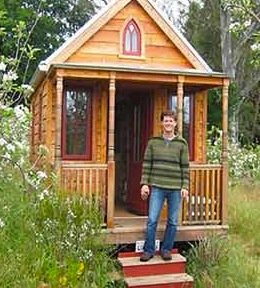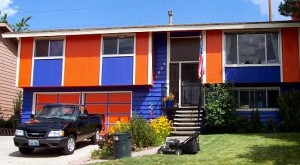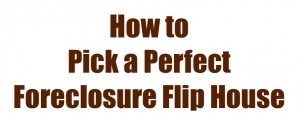It doesn’t seem to matter how long you do something… there is always something new to learn.
In the past week we’ve had two “learning experiences” I’d prefer to have skipped.
1. You Need Accurate Info at the Foreclosure Auction
Accurate information is a must. Everybody knows that. But we learned today information can be “accurate” and “misleading” at the same time.
We have a spreadsheet listing every property for each day’s foreclosure auction. Our list has all the information we think we need to make intelligent decisions… case number, names, address, size, year, type of construction, etc. This way if the bank offers a deep discount on something we didn’t see, at least we have a fighting chance of deciding whether to bid.
Well, there wasn’t much of interest at this particular sale. But there was one property where the bank’s maximum bid seemed really cheap. We were generally familiar with the area, even though we had not seen the particular house. It was a new house, on a little bit of land, in an area of farms. And it sounded like a great deal.
So we bid on it, won and paid the deposit. $3k in cash.
Then we drove out to see our new house. And then we realized our mistake.
Well… the mistake of the person who prepared our spreadsheet.
See, our list said this was a “2034SF/08” house. That means it is just over two-thousand square feet of living space, built in 2008. Or, at least, that’s what it is SUPPOSED to mean.
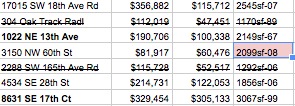 Turns out… this is a 1908 house. Not a 2008 house. Hundred years off. Our spreadsheet was accurate… it was in fact an “08” house… just not “2008”. That’s extremely accurate and incredibly misleading at the same time.
Turns out… this is a 1908 house. Not a 2008 house. Hundred years off. Our spreadsheet was accurate… it was in fact an “08” house… just not “2008”. That’s extremely accurate and incredibly misleading at the same time.
A 2008 house would have been a no-brainer… easy rehab and flip for top dollar.
A 1908 was also a no-brainer…. forfeit the deposit.
Any way… lesson learned, right?
2. You Just Can’t Avoid Crazy People.
We bought a great house about a month ago. The owners had done everything they could to keep the house… filing answers, counterclaims, motions and appeals. They had even filed a separate federal lawsuit, alleging the foreclosing bank committed fraud. ALL of this crap had been summarily dismissed.
We had to evict the owners, who still thought the federal lawsuit protected them (even though it was dismissed months earlier). They were a little nasty about it… telling our agent that he needed to find a better job, wasn’t getting paid enough, and didn’t know what he was talking about. However, once the Sheriff posted the writ, they moved all their things. Surprisingly, they even left the house relatively clean.
So we rehabbed (tile, carpet, counters, paint, pool screen, etc) and put the house on the market. Got a contract right away at our asking price.
Great. Just the way it is supposed to work. Everything is perfect.
Then right before closing, the old owners filed a “lis pendens” in the public records.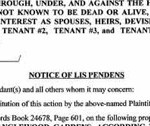
WTF?
Now, all a lis pendens does is warn people a property is involved in litigation. This particular lis pendens is complete bullshit… it references the state foreclosure case and the federal case they filed… both of which have been dismissed and appeal times have run. So the “pending” action it supposedly warns of is non-existent. And it doesn’t even give the property address, so it doesn’t meet the definition of a lis pendens either.
There is absolutely no merit to their claim, and we  will have it resolved within a week. Luckily, we know exactly what to do, and can handle this inexpensively and quickly, since we don’t have to hire outside legal counsel. More importantly, these owners filed their bullshit paperwork with enough lead time that it won’t screw up our closing.
will have it resolved within a week. Luckily, we know exactly what to do, and can handle this inexpensively and quickly, since we don’t have to hire outside legal counsel. More importantly, these owners filed their bullshit paperwork with enough lead time that it won’t screw up our closing.
But you can’t predict Crazy.
And if this had happened to another investor… or happened a little closer to the closing… it could cost a LOT of money. And it could cost the deal. Obviously Crazy Owner has no money… so even if the court sanctions them for wasting everybody’s time, good luck collecting.
Just another risk of buying foreclosures at the auction. Luckily this one wasn’t our fault and could never have been predicted….
What other risks have you seen at foreclosure sales? What have Crazy People done to mess up your investments?
Please COMMENT below– Thanks!

